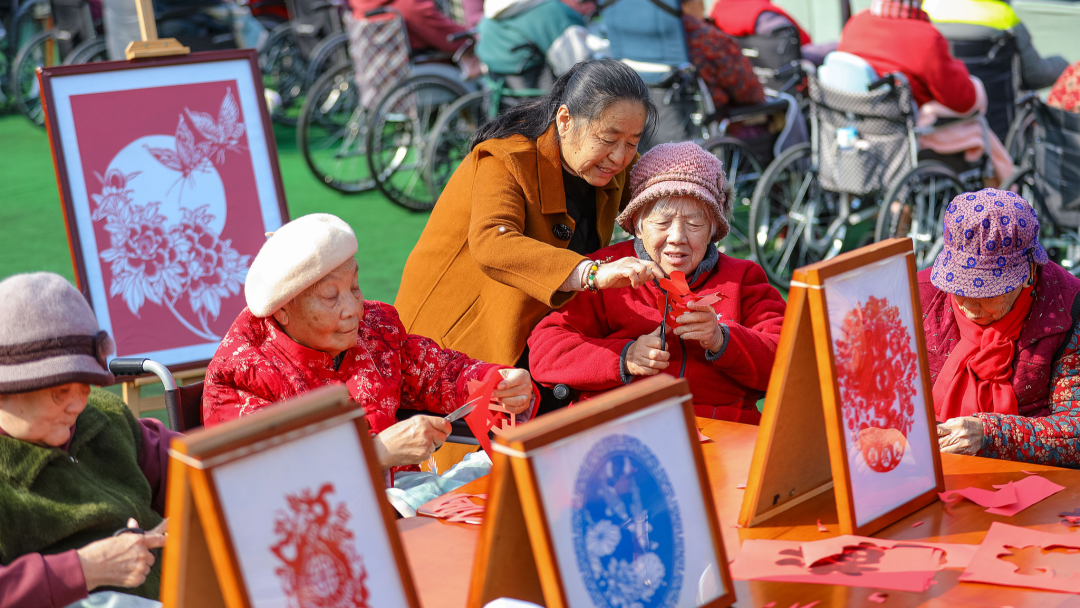
A volunteer guides elderly people in creating paper-cutting works in Qingdao, east China's Shandong Province, October 28, 2025. /VCG
In areas vital to people's well-being, such as employment, health, housing and food security, Chinese government has always been a steadfast practitioner of the people-centered philosophy.
During the Fourth Plenary Session of the 20th Central Committee of the Communist Party of China (CPC) which concluded last week, China outlined a blueprint how the world's second-largest economy will advance its economic and social development over the next five years. Notably, the country pledged to work harder to ensure and improve public well-being and promote prosperity for all.
Applying a people-centered development philosophy which he put forward in 2015, Chinese President Xi Jinping has repeatedly highlighted people's well-being as a goal of the country's economic development.
How will the country continue to practice the philosophy of people-centered development in the next five years? CGTN spoke with Wang Hongyan, professor at the School of Governance, University of Chinese Academy of Social Sciences, to gain her insights.
CGTN: How do you interpret the statements regarding improving people's livelihoods in the Recommendations of the CPC Central Committee for Formulating the 15th Five-Year Plan for Economic and Social Development? Which areas do you consider key priorities?
Wang: According to the recommendations, the CPC Central Committee established the following guiding principles for economic and social development during the 15th Five-Year Plan period: upholding the Party's overall leadership; putting the people first; pursuing high-quality development; comprehensively deepening reform; promoting interplay between an efficient market and a well-functioning government; and ensuring both development and security.
The recommendations on "ensuring and improving public well-being and promote prosperity for all" fully embody and implement these six principles.
The term "resolving the pressing difficulties and problems that concern the people most" reflects that improving people's livelihood in the next five years will require a timelier and more accurate understanding of people's new concerns, worries and expectations.
Social mobility is an important indicator of social vitality, which not only contributes to a high-quality life but also serves as a driving force for high-quality development. Hence, the recommendations emphasized that "the channels of social mobility should remain unimpeded."
In addition, the recommendations proposed not only to boost China's strength in education, science and technology and talent, but also to develop education that meets the people's expectations, which vividly highlights the principle of putting people first.
CGTN: In the 15th Five-Year Plan period, how do you think the principle of "putting people first" will further deepen and expand?
Wang: "Putting people first" is the Chinese expression of the Marxist stance on the people and a key component of Xi Jinping Thought on Socialism with Chinese Characteristics for a New Era. Among the six principles, "putting people first" represents a declaration regarding the goals, practices and outcomes of development – once again emphasizing that development should always be for the people, rely on the people and ensure that its fruits are shared by the people.
More specifically, focusing on economic development as the central task and high-quality development as the main theme, China should proactively explore scientific and effective pathways to ensure that the principle of "putting people first" is implemented at a higher level of quality, continually advancing the all-round development of people and laying the foundation for the basic realization of socialist modernization.
CGTN: One of the major objectives for the 15th Five-Year Plan period is the further improvements in quality of life. What will be its key indicators?
Wang: Achieving socialist modernization is a progressive and evolving historical process.
First, the 15th Five-Year Plan will be a comprehensive framework guided by the goal of promoting the all-round development of the people, taking into account needs across material, cultural, institutional and spiritual dimensions.
Second, the plan will be a tiered system, encompassing public services are inclusive, meet essential needs and provide a cushion for those most in need – ensuring access to childcare, education, employment, healthcare, elderly care, housing and assistance for the vulnerable – while also emphasizing substantive improvements in the accessibility, livability, safety, fairness and diversity of public services.
Third, it will directly address and respect urban-rural and regional differences. Its purpose is to provide scientific support for steadily advancing equitable access to basic public services and promoting integrated urban-rural development through dynamic monitoring.
CGTN: What reform measures do you believe are necessary in key areas such as educational equity, employment promotion, income distribution and elderly care?
Wang: "Comprehensively deepening reforms" is one of the six guiding principles for economic and social development during the 15th Five-Year Plan period. It can be predicted that, on the new journey, areas such as educational equity, employment promotion and income distribution are expected to embrace new opportunities for reform.
Based on my research, advancing reforms in these areas requires significant efforts to enhance the systematic and targeted nature of the reforms. For instance, the promotion of educational resource equity could be combined with deepening digital innovation. Additionally, employment promotion could be approached from advancing regional coordinated development, attracting talent for the large-scale development in the western regions.
In the 15th Five-Year Plan period, efforts will focus on further enhancing the alignment between public services and the needs of the people's livelihoods. The prerequisite for improving this alignment is the accurate identification of these needs, which requires steadfastly following the mass line and making sound decisions based on a comprehensive understanding of the situation. To this end, two approaches can be explored.
First, by going deep into the grassroots, we can enhance the regularity and institutionalization of engaging with the public. Second, leveraging new information technologies such as the internet and artificial intelligence is crucial. Successful examples in this area include Beijing's Swift Response to Public Complaints with the 12345 hotline as the main channel.